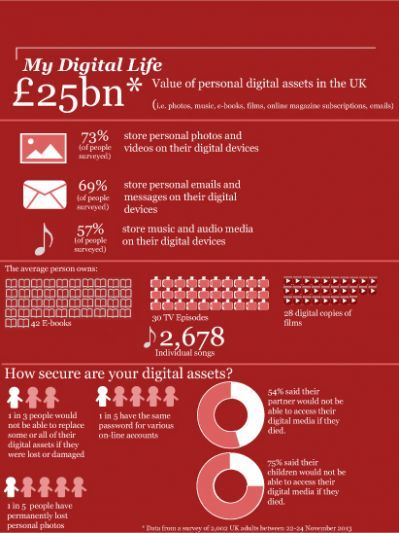

Consumers in the Channel Islands value their digital assets at a total of over £68 million, with their UK counterparts valuing theirs at a total of £25 billion, according to figures in a recent PwC survey.
Consumers in the Channel Islands value their digital assets at a total of over £68 million, with their UK counterparts valuing theirs at a total of £25 billion, according to figures in a recent PwC survey.
The sum represents the total of UK consumers’ personal digital assets, ranging from photos of loved ones to episodes of TV programmes. But the PwC survey of attitudes towards our digital lives also reveals that in spite of spending over £136 million a year in the Channel Islands (£50 billion in the UK) buying goods and services online, many of us are not doing enough to protect digital assets. The survey found that a third of consumers (31%) would not be able to replace some or any of their assets stored digitally if they lost them or if they were compromised in some way.
Nick Vermeulen, Partner, PwC Channel Islands, said:
“In the Channel Islands we closely mirror the UK. Our digital lives are spread across a number of different devices and we all have, and store, digital assets ranging from books and games to music, spreadsheets, family photos and personal messages. Some have more sentimental than monetary value and we cannot put a value on them, yet we know if we lost them it would affect us dearly. It is time for us all to take stock of what we are keeping, think about how valuable it is and whether we are doing enough to protect it. As the digital economy grows and we build a digital world for ourselves, it is critical that we protect what matters most to each of us.”
The survey also found that photos of loved ones are top of the list of things UK consumers like to store digitally (73%) followed by personal emails or other messages (69%) and music (57%). Women value their photos more than men (61% to 43%), while men are more likely to choose personal documents and media content, such as films or TV programmes, as the digital assets they would be most keen to get back if lost. Photos are also the things we would be most likely to pay to recover if lost (52%), while in distant second place is personal information such as financial documents (19%).
On the face of it, UK consumers are keenly aware of the need to protect valuable digital assets. Over a third (36%) use external hard drives at home and 29% use cloud services, but 32% of consumers still keep paper copies to store information. Meanwhile, the older generation are more security-savvy and less likely to use the same password (18%) for their accounts and devices than the younger generation (29% of 18 - 34 year olds).
More than half of consumers use the same password for their various accounts and devices and 22% use the same password for everything. These findings indicate that younger people, who have grown up with the internet, may be less aware of security risks and their views on privacy are more relaxed than the older generation.
Finally, a quarter of UK consumers say that nobody would be able to access their digital content after their deaths, representing a huge amount of paid-for or sentimentally-valuable digital content lost forever.
Echoing the words of the PwC cyber security team in the UK, Nick added:
“If our digital assets are so important to us, we should start thinking about what happens to them after we pass away. Do you want to bequeath your favourite songs, photos and TV programmes to your children? They form part of your estate, albeit digital, so why not? One day we may start to consider these assets in our wills, in the same way we think about other investments we have.
"If we as individuals are becoming ever more reliant on digital assets, imagine how much more so it is for organisations. Protecting those digital assets, even when managed by other parties, is now an imperative that no business can ignore."